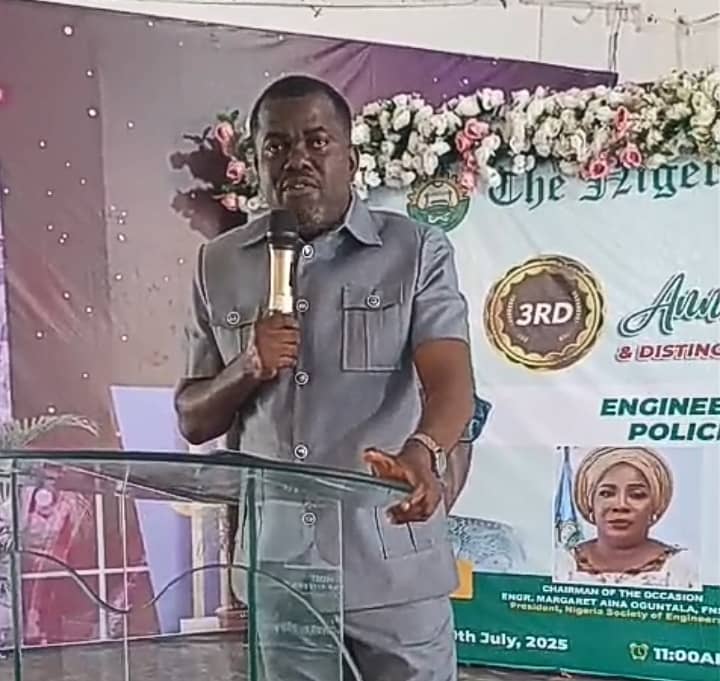FEATURED
Akpobire Urges Tinubu to Appoint a Chief Engineer of the Federation

•Advocates for creation of a National Engineering Institute like Nigeria’s Law School
The Delta-based development advocate and engineer, Comrade Michael Akpobire, has urged President Bola Tinubu to formally creation and appoint a Chief Engineer of the Federation and by extension, Chief Engineers in the 36 states akin to the roles of the Attorney-General, Accountant-General, or Surveyor-General to bridge the gap in the engineering sector.
Akpobire made the call while delivering a keynote lecture at the 3rd Engr. Adams C. Okoene Annual Public Lecture and Distinguished Personalities Award Ceremony, organised by the Nigerian Society of Engineers (NSE), Ekpoma Branch, with the theme: “Engineering Practice, Government Policies, and Politics in Nigeria.”
The former Executive Secretary of the Delta State Technical and Vocational and Education Board, (TVEB), under Governor Ifeanyi Okowa’s administration, argued that such a position is crucial for national planning and execution of engineering-driven infrastructure and technological advancement.
“The absence of a central engineering voice at the policy and decision-making table is a serious oversight. We must institutionalize this role to consolidate and synergize national engineering strategies,” he asserted.
Akpobire also decried the routine appointment of non-engineers to head ministries and agencies that require technical insight.
He stressed that political appointments in engineering-related ministries should prioritize professionals who understand the industry’s intricacies.
In the same vein, he urged the federal government to urgently establish a dedicated Engineering Training Institute, model after the Nigeria Law School for lawyers.
He said that such a school would bridge the wide gap between classroom theory and real-world engineering practice.
Akpobire, drawing from nearly two decades of experience in public engineering leadership, lamented the glaring deficiencies in the current engineering education framework, which, he said, produces graduates ill-prepared for practical challenges.
He proposed the creation of a national engineering training institute, supervised by the Council for the Regulation of Engineering in Nigeria (COREN), to provide structured, post-graduate, hands-on training as a mandatory prerequisite for licensing and professional recognition, just like doctors and lawyers undergo housemanship and law school, respectively.
“The success of the legal and medical professions in Nigeria is largely owed to institutionalized professional training. Engineering deserves no less,” Akpobire said, adding that the curriculum must be industry-focused, and the institute funded through an endowment drawn from government contracts, multinational companies, and contributions from practicing engineers.
On the issue of training and licensing, the guest speaker emphasized that most technical colleges and vocational centers are under-equipped and disconnected from industry needs.
He cited a 2017 World Bank-assisted study which revealed that most graduates were being trained for exams, not for job readiness.
In response, he shared success stories from pilot reforms that included curriculum enrichment, teacher retraining, tool commissioning, and renewable energy integration in workshops.
He further advocated for a unified engineering profession, where artisans, craftsmen, technicians, technologists, and engineers are respected within a single framework and can transition smoothly through the ranks, without being marginalized.
The lecture, rich in research and policy suggestions, was well-received by industry stakeholders, academics, and policymakers present at the event.
Several attendees commended Engr. Akpobire’s visionary ideas, particularly the engineering institute and Chief Engineer proposals, as game-changing solutions capable of transforming Nigeria’s engineering landscape.
The event also featured the presentation of awards to distinguished individuals who have contributed significantly to the growth of engineering in Nigeria.
In closing, Engr. Akpobire urged the NSE, COREN, and government agencies to work together and act decisively on the recommendations, noting that the time for cosmetic changes is over.
“By institutionalizing professional training and appointing Chief Engineers, we can finally place engineering at the heart of Nigeria’s development agenda,” he said.
















